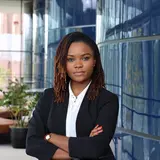Facing the Challenges of Climate Change
Tiago Cruz MAM ’17 reflects on a talk about climate change and its impact worldwide.
Being a Master of Advanced Management (MAM) student means many things at the Yale School of Management. Ideally we are here to explore everything Yale has to offer, academically, professionally, and socially. But with that privilege, comes a big responsibility: to use all of the resources we have available to us here, and to develop ourselves not as the leaders we would like to be, but the leaders the world needs, so that we can create sustainable ways for business and society to confront pressing issues. That is why we have our core course centered around global issues, where we explore issues of critical importance to the world, such as inequality, pandemic health issues, water scarcity, cybersecurity, and more.
Coming into the MAM program, I knew that this would be a part of the program, but with each lecture we have, the more my eyes are opened to looking at the world’s pressing issues and the more I contemplate how I can be proactive in solving them; this is where business must meet society, which is a central pillar of this program for me.
A recent lecture focused on a topic that is certainly on everyone’s mind: global warming. This is such a hot topic that Professor Doug Kysar was bombared by questions from the MAM class during his presentation, from topics that ranged from the corporate responsibility to reduce carbon emissions to the carbon off-set market. Everyone brought perspectives from their home country, citing deforestation in Chile and Brazil in part due to the increase of meat consumption, and lack of business interest to pursue sustainable alternatives in countries such as Nigeria.
It was a sobering lecture, but Prof. Kysar summed it up perfectly when he said, “Even if we stop all [carbon] emissions tomorrow, it would take us 1,300 years to go back to the same atmospheric condition we had pre-industrialization.” There is no doubt about the effect that we as a species have had on the planet, and what that means going forward. The Climate Change Impacts in the United States report commissioned by the U.S. government clearly shows the impact humans had on the planet and the direction we are headed, and the projected results are catastrophic.
It is surprisingly easy to forget about this and go on with our day-to-day lives, even with such dire consequences ahead, but there is a need for immediate action and to overcome the hurdle that is getting countries around the world to work together. That is why a course like this is so important.
“We need to challenge ourselves to go outside the regular recruiting cycles and go work towards saving the planet. This will be the end of us; what more motivation do we need?” Clint Bartlett, one of my colleagues, said.
I see his point. It is easy to get drawn in to the regular career paths one expects after a degree program, but we must recognize the role we can play in the world, tackling big issues such as this.
The class closed with Prof. Kysar saying that if he had a magic wand and could get only one wish, he would institute a global harmonized carbon tax, to which Senior Associate Dean David Bach stated that policy discussion and consumer awareness are also an important factor. But this is also an opportunity for entrepreneurs. “There is value to be created, there are opportunities to pursue, there is a planet to be saved,” he said.



